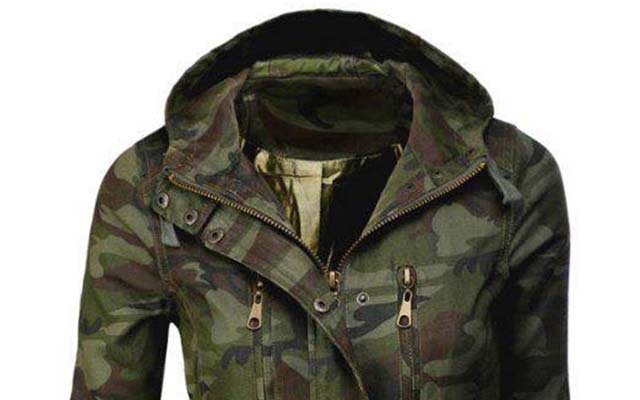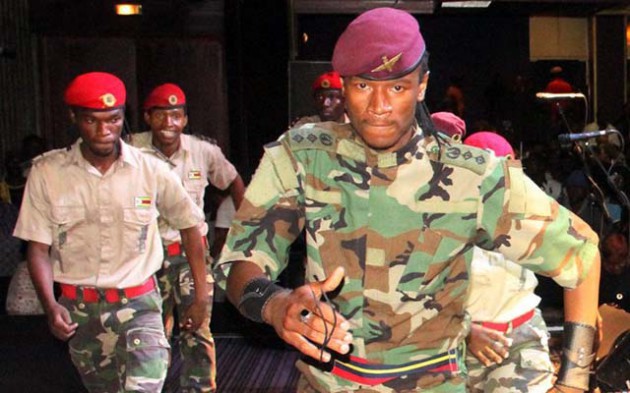Passion for crime of fashion


Jah Prayzah and his band got permission to wear military regalia on stage
Fungai Lupande:Lifestyle Writer
Despite several warnings from authorities against wearing camouflage, some members of the public seem unfazed and many have made military colours their favourite outfits.Trendy camouflage outfits have been a hit in the country for sometime and people are finding the military print irresistible, seemingly oblivious of the fact that it is a criminal offence for members of the public to wear soldiers’ colours.
Many boutiques sell fancy camouflage clothes ranging from men’s pants, ladies jeggings, jackets, ladies tops and caps, to name just a few.
Most of these items are imported and look undeniably irresistible while mostly affordable.
Camouflage may be an interesting choice of outfit but in Zimbabwe the law prohibits anyone who is not a member of the army from wearing camouflage or anything that resemble it.
The Zimbabwe National Army protects military regalia.Although the law was passed years ago, not many people have knowledge of it or take heed.
Director Army Public Relations Lieutenant Colonel Alphios Makotore took his time to explain the laws that prohibits wearing camouflage.
“Through the country’s laws, in particular the Criminal Law and Codification Act, Chapter 9:23, Section 179 impersonating a police officer, peace officer or public official is illegal,” he said. “Furthermore, the Defence Act (Chapter 11:02) states that it is not allowed for members of the public to wear camouflage.
“The Zimbabwe Republic Police, as the law enforcement agents, are the arresting authorities, whenever such kinds of offences are detected.

Some fans at Jah Prayzah’s recent UK show. In Zimbabwe it is illegal for members of the public to wear military regalia
“Soldiers can effect a citizen’s arrest, report and/or escort offenders to the nearest police station.”
Lt Col Makotore added that Section 99(2)(c) of the Defence Act (Chapter 11:02) prohibits members of the public from wearing any kind of military regalia.
“The section provides that; ‘Any person who without authority wears or uses any decoration supplied to or authorised for use by any member of the Defence Forces or other military forces or any decoration so nearly resembling such decoration as to be likely to deceive shall be guilty of an offence,’” said Ltd Colonel Makotore.
However, the legislation does provide for exceptions, no wonder why artistes like Mukudzei Mukombe, known as Jah Prayzah, wears camouflage as his brand clothes on stage.
Such artistes are required to seek authority from army headquarters first and Lt Col Makotore explains what the exception provides for.
“Section 99(2)(c) of the Defence Act (Chapter 11:02) specifies the exception, ‘Provided that this subsection shall not apply in relation to any uniform or decoration for the purposes of any bona fide stage, film or television production or military representation.’
“Further to this, Section 99(4) states that, ‘in any prosecution for any offence in terms of this Section relating to any act done without due or lawful authority, it shall be presumed, unless the contrary is proved that accused had no such authority’.”
Bethan Pasinawako, another artiste who was authorised to wear camouflage as her brand clothes on stage said she feels in control when wearing the army gear.
She said when she is wearing camouflage she feels in authority and ready to do great things.
“When I am on stage it is a serious moment for me and it’s not a time for me to play. Camouflage represents seriousness and power,” she said.
“Wearing camouflage makes me feel that I am representing the army of God.”
Other artistes like Sniper Storm and Commander Lee amongst others are fond of camouflage. Section 32 of the Criminal Law (Codification and Reform) Act states the consequences of the camouflage offence.
“Camouflage uniforms mean any article of wearing apparel made of material carrying military-style camouflage markings,” reads the Act.
“Any person who unlawfully possesses or wears any camouflage uniform shall be guilty and liable to a fine not exceeding level five or imprisonment not exceeding six months or both in the case of unlawful possession of camouflage uniform.
“For wearing camouflage uniform a convicted person is liable to a fine not exceeding level six or imprisonment not exceeding one year or both.”
However, the above conviction and sentence shall not apply to an authorised person.
In an interview, a Harare name Mr Mandlaenkosi Sibanda said he had no idea that camouflage clothes are illegal.
“I heard it from other people that camouflage is not allowed but I didn’t know for certain that it is a criminal offence,” he said.
“I see my favourite celebrity Jah Prayzah wearing camouflage and as a fan I end up buying some camouflage items not knowing it is an offence.
“We don’t often hear of people who are arrested for wearing camouflage but I heard that years ago members of the Zimbabwe National Army used to confront people they saw wearing it.
“I also remember a few months ago a member of the army was arrested after stripping a civilian of his camouflage T-shirt. It is not clear how the law is implemented”
A fashionista who refused to be named said camouflage clothes are a charm especially mixed with other accessories and colours.
“It might have been said before that it is an offence to wear camouflage but I guess people easily forget because in other countries camouflage is simply just like any other print,” she said.
“Camouflage is a print that is undeniable, appealing, makes one feel outstanding and connected to the army. With the new stylish ranges one can go beyond a classic military inspired look.”
However, according to the law members of the Zimbabwe National Army, ex-soldiers and those who masquerade as soldiers are not allowed to attack civilians they see wearing camouflage
The law says the correct procedure, when a soldier sees a civilian wearing camouflage, is to effect citizen arrest and escort that person to the nearest police station.
In June this year a Harare man, Simbarashe Sithole (29) who claimed to be a member of ZNA appeared in court for stripping a civilian Lloyd Kuzondishaya of his camouflage T-shirt.
ZNA disowned Sithole saying he was discharged in 2008 on disciplinary grounds.
Sithole was sentenced to an effective two years for harassing the civilian, ordering him to do press-ups and robbing him of his mobile phone and $1.
Last year, Norest Muranda of Chikanga in Mutare was fined $120 after he was caught wearing his uncle’s army regalia.
The presiding magistrate Ms Sekai Chiundura advised Muranda to “join the army if he wanted to enjoy their colours legally”.










Comments